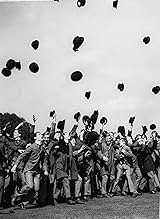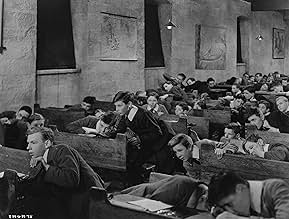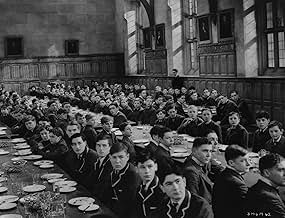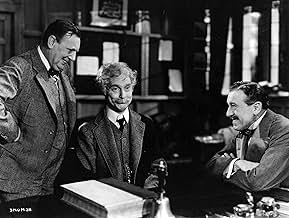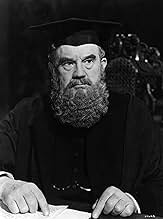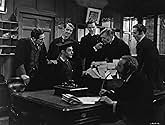NOTE IMDb
7,9/10
12 k
MA NOTE
Un enseignant âgé et ancien directeur d'un pensionnat se souvient de sa carrière et de sa vie personnelle au fil des décennies.Un enseignant âgé et ancien directeur d'un pensionnat se souvient de sa carrière et de sa vie personnelle au fil des décennies.Un enseignant âgé et ancien directeur d'un pensionnat se souvient de sa carrière et de sa vie personnelle au fil des décennies.
- Réalisation
- Scénario
- Casting principal
- Récompensé par 1 Oscar
- 6 victoires et 8 nominations au total
Paul Henreid
- Staefel
- (as Paul Von Hernried)
Edmund Breon
- Colonel Morgan
- (as Edmond Breon)
Ernest Blyth
- Austrian Officer Boarding Train
- (non crédité)
John Blythe
- Boy Calling Assembly
- (non crédité)
Avis à la une
The children attending the Brookfield school are no ordinary English boys; they are the the children of the upper classes of society, who for generations have learned from institutions such as the school represented here. They are molded at places like this fictional one to be leaders of their country. Mr. Chipping is a teacher who gives his life to Brookfield, only to be bypassed when promotions are handed out. His love for the profession and his dedication to the formation of these children are his reasons for living. Most of his own life is spent at the school. Only in times of crisis is Mr. Chipps recognized. Mr. Chipps knows happiness only too briefly. He is extremely lucky when he finds Katherine. One can see the rapport in her, although we never see it explicitly on Chipping's face, maybe because a stiff upper lip that doesn't let him express his true feelings to a woman who adored him from their first encounter. Mr. Chipps lives long enough to learn about the death of his beloved students in several world conflicts. As a father figure, his life is full because the love and admiration the young boys feel for him. The film made Robert Donat a favorite of the movie going public. Mr. Donat goes from being a taciturn person into a jolly old man living on his own because Katherine dies young. The film improves tremendously when Greer Garson appears. Her luminous presence changes the tone of the movie because of her incredible charm. Paul Henreid makes a short appearance as Staefel, the fellow teacher who invites Mr. Chipps to accompany on a vacation trip to Austria. Sam Wood direction pays a close look to detail. The film is a classic and will live forever.
The more I read on IMDB the more I realise that so many people interested in movies do not consider films more than 25 years or so old. I suspect that this is because most users of IMDB are aged 30 - 40 ish. Goodbye Mr Chips is exactly (on first sight) the type of movie that many of you would not even consider viewing. It has no special effects, cost peanuts to make, no clever camera work but it does have those three essentials - superb story, great script and staggeringly good acting from Donat. The movie is about life, relationships, about despair and decency and the power of love. What more could anybody ask for in a movie? If this film doesn't move and inspire you then truly nothing will.
P.S. the Peter O'Toole version is pretty dire!!
P.S. the Peter O'Toole version is pretty dire!!
Here's another one of those old-fashioned movies in which people are all nice: no villains. It's a refreshing change of pace, once in a while, at least for me.
Sometimes it's relaxing just to just kick back with a story that just makes you feel good, doesn't upset you at any time. There are some touching scenes with some sadness in here, too, however, but the sincere story and great acting make you glad you watched it.
Robert Donat, as Mr. Chippings, is a pleasure to watch, particularly when he plays the character in his declining years. Greer Garson gets equal if not top billing, but that's not right. Her role is not that big in this picture.
Another nice feature you don't see much, at least in post-1960 films - all respectful kids in here, with manners. Nice adults, nice kids, nice story - probably too corny for most people of today in our cynical world. Too bad. Their loss.
Sometimes it's relaxing just to just kick back with a story that just makes you feel good, doesn't upset you at any time. There are some touching scenes with some sadness in here, too, however, but the sincere story and great acting make you glad you watched it.
Robert Donat, as Mr. Chippings, is a pleasure to watch, particularly when he plays the character in his declining years. Greer Garson gets equal if not top billing, but that's not right. Her role is not that big in this picture.
Another nice feature you don't see much, at least in post-1960 films - all respectful kids in here, with manners. Nice adults, nice kids, nice story - probably too corny for most people of today in our cynical world. Too bad. Their loss.
A lot of people were mystified that Clark Gable did not win the Oscar for "Gone With The Wind", but as good as he was, he had to play 2nd fiddle to Robert Donat for his amazing performance as Mr. Chipping in "Goodbye Mr. Chips". His was one of the really great acting achievements, and certainly the best he ever did. One has to wonder if ill-health had not shortened his life, just how many more Awards he would have got - but then not many roles like Mr. Chips came along. In what was one of her very early roles, Greer Garson made a lovely Mrs. Chipping - just right for this. Ably supporting was Paul Henreid and Terry Kilburn, but Donat shone like a beacon. The atmosphere of that gentle time in England was well captured by Sam Wood, and this truly is a film for film buffs to really enjoy. If you can get it on DVD or Tape, do so.
Director Sam Woods (`Kitty Foyle: The Natural History of a Woman,' `King's Row,' `For Whom the Bell Tolls') 1939 film `Goodbye Mr. Chips' features a top-notch performance by Robert Donat as the somewhat stuffy English prep school teacher, Mr. Chippings. Chippings early career difficulties are overcome, as is his shyness after he meets Greer Garson (`Mrs. Miniver') in the Alps while on holiday. Garson is able to show the stodgy Chips how to live life and her effect on him lasts throughout the rest of his life, although Garson is not around for long.
The film uses recurring patterns to show the passage of time, namely the showing of the boys arriving at the school each year in the autumn. These segments often contained little historical snippets between the boys, such as `we now have telephones, do you know how to use one?' and mention of Queen Victoria's death and the remark that `it is going to be strange to have a King.' Other historical comments occurred between the teachers such as the remark on a book by a new author, H.G. Wells and how he will never last because his writing is too fantastic. Sadly, Chip's historical error occurs when he comments to the boys that they will not have to go off to World War I as the war cannot possibly last more than a few weeks. So many of the teachers and students end up losing their lives in the Great War. Some other scenes from this film have been parodied through the years in comedies, most noticeably the scenes in the great hall when the headmasters are speaking to the boys is sent up hilariously by John Cleese in `Monty Python's the Meaning of Life' and the scene where Chips canes an insolent student (it is filmed as a shadow against the wall) is later parodied when a punisher is reprimanded for whipping the shadow, not the victim (my memory is failing me here, but I think this is in 1969s `Take the Money and Run' by Woody Allen, I could be wrong as a part of me also thinks that this could be in Mel Brooks' `Blazing Saddles.')
Donat aptly handles the complex role of Chips through the years, from about his mid-20s until his 80s. This may be one of the earlier movies that so aptly chronicles the life and times of a person through such an expanse of years, Dustin Hoffman in `Little Big Man' also performs n this manner, as does Al Pacino in `The Godfather Trilogy,' albeit over the length of three long movies. Even more outstanding and interesting about Donat and his character is that he covers so much of a common man's existence; Chips is a teacher, not a King, general, messiah or Mafia chieftain.
The film uses recurring patterns to show the passage of time, namely the showing of the boys arriving at the school each year in the autumn. These segments often contained little historical snippets between the boys, such as `we now have telephones, do you know how to use one?' and mention of Queen Victoria's death and the remark that `it is going to be strange to have a King.' Other historical comments occurred between the teachers such as the remark on a book by a new author, H.G. Wells and how he will never last because his writing is too fantastic. Sadly, Chip's historical error occurs when he comments to the boys that they will not have to go off to World War I as the war cannot possibly last more than a few weeks. So many of the teachers and students end up losing their lives in the Great War. Some other scenes from this film have been parodied through the years in comedies, most noticeably the scenes in the great hall when the headmasters are speaking to the boys is sent up hilariously by John Cleese in `Monty Python's the Meaning of Life' and the scene where Chips canes an insolent student (it is filmed as a shadow against the wall) is later parodied when a punisher is reprimanded for whipping the shadow, not the victim (my memory is failing me here, but I think this is in 1969s `Take the Money and Run' by Woody Allen, I could be wrong as a part of me also thinks that this could be in Mel Brooks' `Blazing Saddles.')
Donat aptly handles the complex role of Chips through the years, from about his mid-20s until his 80s. This may be one of the earlier movies that so aptly chronicles the life and times of a person through such an expanse of years, Dustin Hoffman in `Little Big Man' also performs n this manner, as does Al Pacino in `The Godfather Trilogy,' albeit over the length of three long movies. Even more outstanding and interesting about Donat and his character is that he covers so much of a common man's existence; Chips is a teacher, not a King, general, messiah or Mafia chieftain.
Le saviez-vous
- Anecdotes34-year-old Robert Donat ages 63 years (1870-1933) over the course of this movie. He remarked: "As soon as I put the mustache on, I felt the part, even if I did look like a great Airedale come out of a puddle."
- GaffesMiss Kathy tells Chips that the ballroom in Vienna is where Metternich drew up "the treaty of the five kings" (referring to the Congress of Vienna in 1814 ending the Napoleonic Wars) "nearly 100 years ago." But the montage after Kathy's death makes clear she died before the Boer War (1899) and Queen Victoria's funeral (1901). 100 years after the Congress of Vienna was 1914, the start of World War I when Chips becomes acting headmaster, and Kathy is spoken of as having died long ago.
- Citations
[dying words]
Mr. Chipping 'Mr. Chips': I thought I heard you saying it was a pity... pity I never had any children. But you're wrong. I have. Thousands of them. Thousands of them... and all boys.
- ConnexionsEdited into Hollywood: The Dream Factory (1972)
- Bandes originalesBrookfield School Song
(uncredited)
Music by Richard Addinsell
Lyrics by Eric Maschwitz
Performed by orchestra in opening credits
Sung by male chorus during school assembly and during closing credits
Meilleurs choix
Connectez-vous pour évaluer et suivre la liste de favoris afin de recevoir des recommandations personnalisées
Détails
- Date de sortie
- Pays d’origine
- Langues
- Aussi connu sous le nom de
- Goodbye, Mr. Chips
- Lieux de tournage
- Repton School, Repton, Derbyshire, Angleterre, Royaume-Uni(Brookfield School)
- Sociétés de production
- Voir plus de crédits d'entreprise sur IMDbPro
- Durée1 heure 54 minutes
- Couleur
- Rapport de forme
- 1.37 : 1
Contribuer à cette page
Suggérer une modification ou ajouter du contenu manquant



